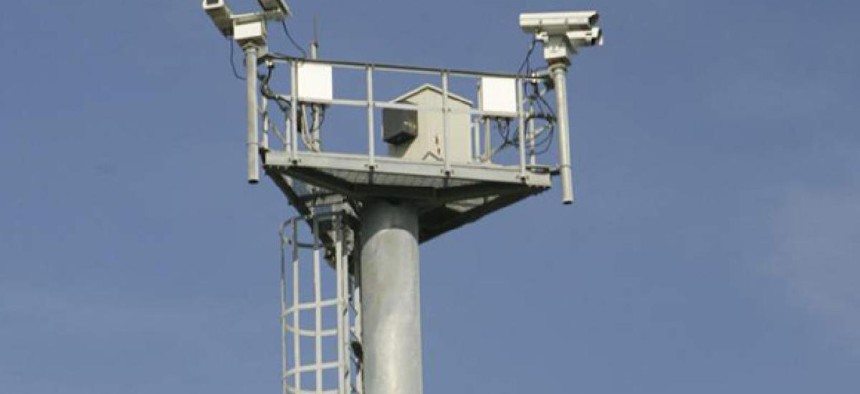Southwest video surveillance tech buy undergoes 11th-hour changes

Homeland Security
Revisions indicate proposed camera systems will be judged on stricter performance criteria.
Just as vendors likely began submitting bids for a Southwest border surveillance contract, the Homeland Security Department expanded the criteria that they would be judged on, according to contract documents.
The remote video surveillance system, or RVSS, is part of DHS Customs and Border Protection’s transition from an ill-designed $1 billion virtual fence to stand-alone watch guard technologies better suited for the harsh environment.
Firms are bidding on major business deals for towers and video cameras to replace the 2006 Secure Border Initiative network, or SBInet, contract that Boeing Co. held. CBP made the last-minute changes to stiffen the evaluation criteria two days before bids were due on April 19.
The video setup is intended to let Border Patrol agents monitor illegal activities along the Arizona border and potentially at Texas locations, according to the solicitation.
In the original Feb. 24 request for proposals, officials said recommended technologies would be winnowed down based on weaknesses, significant weaknesses and deficiencies. The definitions of those terms were terse, dealing mostly with schedule delays and cost overruns. Initially, a weakness was “a flaw in the proposal that increases the likelihood of unsuccessful contract performance,” while a significant weakness constituted “a flaw in the proposal that appreciably increases the likelihood of unsuccessful contract performance.” A deficiency was described as “a material failure of the proposal to meet a requirement, or a combination of significant weaknesses that increase the likelihood of unsuccessful performance to an unacceptable level.”
The revisions made on April 17 toughened the conditions. A weakness now means a flaw that increases the likelihood of unsuccessful “system performance,” “a failure to adequately address the desired capabilities in quality or quantity” as presented in the RFP, “unsuccessful contract performance,” or a combination of any of these problems. A significant weakness is a weakness, or combination of weaknesses, based on the wider definition of “weakness.” A deficiency now is described as a material failure or significant weaknesses that increase the chances of “unsuccessful contract or system performance” -- rather than simply “unsuccessful performance.”
On Tuesday, CBP spokeswoman Jenny Burke said, “these definitions were revised in order to provide clarity on how we will evaluate proposals against the requirements.”
The government did not postpone the deadline to let vendors update their bids, because “the amendment did not affect or change requirements that were stated in the RFP,” she added.
Firms already were obligated to offer pre-designed products available off production lines, so CBP reasoned the changes would not affect bids: “The solicitation is for the purchase of nondevelopmental solutions. A change in our definitions should not have an impact to any proposed solution,” Burke said.
CBP officials said they expect to award the project before October.
Due to the sensitivity of the new video solicitation, much of it is behind a firewalled “reading room” that’s restricted on a need-to-know basis to authorized vendors that have signed nondisclosure agreements.
In March, CBP accidentally leaked what may be the trade secrets of a contractor associated with a border project. In announcing the mistake, officials deleted the online documents, temporarily shut down the reading room and asked that anyone who viewed the materials destroy them immediately.
The released documents, named 80' Monopole Dwgs.pdf and 80 Foot Monopole Spec's V1.0.pdf, apparently displayed a contractor’s drawings and specifications for monopole communications towers. Boeing, a likely competitor for the new contract, supplied towers and other structures for the scrapped SBInet and now provides CBP with a remote video surveillance system along the northern border.
NEXT STORY: No Growth in Federal IT Pay






